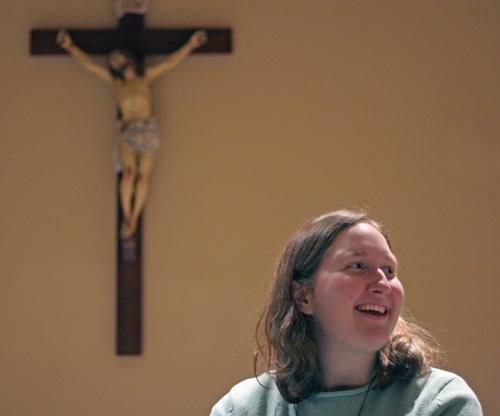Student decides to devote life to religious calling

Engineering senior Mary Carlson relaxes before a discernment group meeting at St. Clare Convent at the corner of 6th and Armory in Champaign, Monday. The group met with several sisters in the convent to talk about the decision to become a nun after gradua Joseph Lamberson
Feb 1, 2007
Last updated on May 12, 2016 at 07:31 a.m.
Mary Carlson appears no different from the average college student as she reclines in a large green chair in her Newman Hall dormitory. She considers herself a volleyball and ultimate Frisbee enthusiast and enjoys watching her favorite movie, “Life Is Beautiful.”
Her dorm walls give more insight into her life as they are covered in pictures of her travels to Rome and Egypt, which sit below a poster she created for class about chlorination and improving the quality of water in developing countries. Among her photo collection are the pictures of two children she sponsors in Latin America and Zambia. Next to the children is a picture of two hands wrapped around wet gray clay, imprinted with the biblical passage, “As the clay is in the potter’s hand, so you are in mine.”
The one thing that separates Carlson from many of her peers is her post-graduation plan: joining a convent.
“I’ve been thinking about it for the past four years,” said Carlson, senior in Engineering. “I’m not sure where I would enter and exactly what time, but I really feel that God is calling me to religious life.”
Get The Daily Illini in your inbox!
She is not alone either, as the number of women planning to devote their lives to religion after graduation increases, both at the University and across the country.
When Sister Sarah Roy, spiritual director and head of the discernment group for young women interested in becoming sisters at the Newman Center, was attending the University in 2002, she was one of only two women interested in becoming a nun. Both women had been the first in years. Recently, however, Roy noticed at least 10 girls have shown interest in learning more about becoming a sister.
“I think religious life points to a truth and gives them structure in their lives,” Roy said. “It helps them to live that ideal.”
Katharine Johnson, senior in Communications, who is also interested in becoming a sister, said that Pope John Paul II had an influence on Catholic youth, which may be a cause of this increase.
“With the help of many, he realized there were youth in the church that were thirsting for faith,” Johnson said.
For Carlson, the idea of becoming a nun was always in the back of her head, but it took many years for her to be certain of her future plans. Commitment to public service, her beliefs and establishing strong relationships with the staff at the Newman Center were all pivotal in making her final decision.
“It’s never been one peak, mountain-top moment,” she said. “It was really like lots of whispers from God.”
While Carlson is clear about her decision to pursue religious vocation after graduation, Johnson remains on the fence, still unsure whether to devote her life to the convent or to marriage.
“What I’ve been doing for about the last three years is looking at both vocations, both the call to marriage and the call to religious life,” she said. “I’m figuring out where my qualities and my happiness as a person fit in with both occupations.”
Vocation training to become a sister, also known as formation, takes approximately seven years (although it can take up to nine) to complete and includes four stages: postulant, novice, temporary vows and final vows. In the first year, a sister is a postulant and learns about her community. The second year, being a novice, includes intense prayer. Temporary vows are taken for the next three years and then followed by another two years of temporary vows before deciding to take the final vows.
Even more challenging than making a final commitment to the convent for these women is living on a secular campus known for events like Unofficial.
“A majority of the world is living like that, drinking in excess and not valuing the human person,” Carlson said.
Johnson also recognizes the importance of representing herself respectively, especially on a secular campus.
“I know how much is too much to drink, and I know how to dress modestly so that I don’t attract attention that I don’t need,” she said.
Both women said they value the experiences they have gained while living on a diverse campus with different religious and moral beliefs.
“It’s opened my eyes to see beauty everywhere and in every religion,” Carlson said.
Johnson likes the University’s diverse student body, saying that she “doesn’t have the ability to be in a bubble” and doesn’t feel sheltered from the real world.
Regardless of the differences in lifestyle between these young women and many of their peers, Roy said she still feels that it is unfair that sisters receive a bad reputation for being old, grumpy and strict.
“It’s a stereotype that we hit people with rulers, and yes, that’s happened in the past, but that’s not how sisters live anymore,” she said. “I think most sisters have a joy in their heart that most people don’t experience.”
Despite stereotypes, temptations to drink and being surrounded by differing opinions on religion, Carlson said she feels the hardest part about her decision is the sacrifices she will have to make, which include devoting less time to her family. Nonetheless, she is ready to accept whatever life brings her.
“My family would love to see me married and have a family, of course, but they’re very encouraging,” she said. “They know that I feel called to religious life.”





